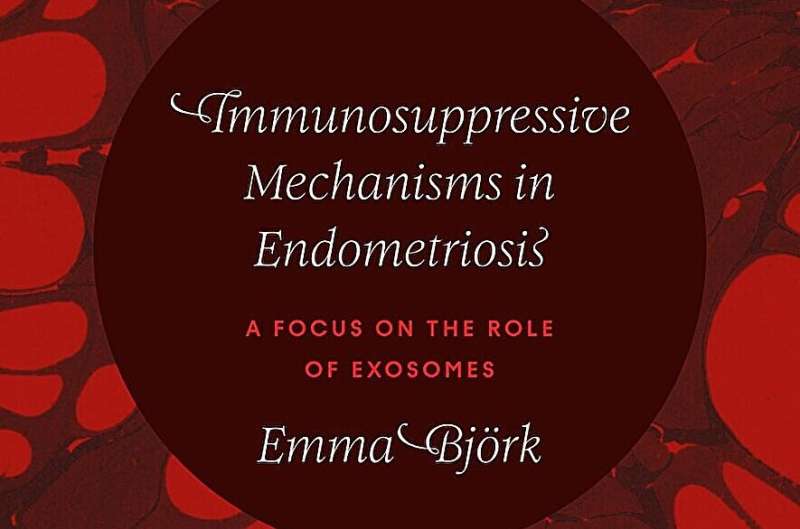This article has been reviewed according to Science X's editorial process and policies. Editors have highlighted the following attributes while ensuring the content's credibility:
fact-checked
trusted source
proofread
Researcher discovers that endometriosis tricks the immune system in the same way cancer does

Treatment options for those suffering from endometriosis are currently few, but research at Umeå University provides new opportunities to understand the disease. A new thesis answers the question of how cells, which are normally found inside the uterus, can gain a foothold in the abdomen and evade the immune system. The results can hopefully contribute to new treatments.
Endometriosis is a benign, chronic disease, in which tissue similar to the lining of the uterus attaches to places in the body other than inside the uterus and causes pain.
Emma Björk, Department of Clinical Sciences, has shown in her research that endometriosis secretes so-called exosomes that trick the immune system into inactivity in the same way that cancer does.
Endometriosis also secretes something called cytokines, which produce an immune response that counteracts the removal of the endometriotic cells.
"It is known that the immune system's so-called natural killer cells do not function optimally in endometriosis and therefore do not kill the endometriotic cells, but it has not been known why," says Björk.
These exosomes carry molecules that inhibit the activity of natural killer cells and increase programmed cell death in active immune cells. These two mechanisms give the endometriotic tissue the opportunity to both persist and grow in the body.
Similar experiments were carried out in ovarian cancer, and it turned out that ovarian cancer also secretes exosomes with molecules that inactivate natural killer cells.
Björk's thesis also investigates the expression of cytokines, i.e., small proteins that are used for communication between cells. Among other things, an immunosuppressive cytokine response was observed, and microscopy showed an increased number of immune cells of a type that inhibits the activity of natural killer cells in the endometriotic tissue.
The study demonstrates several mechanisms affecting the function of natural killer cells in endometriosis. This new knowledge contributes to the understanding of how the disease can arise and further develop. Hopefully, the results can contribute to new treatments and diagnostic possibilities.
"At present, it takes several years to be diagnosed, and the treatments available often cause side effects. Exosomes will probably lead to ways to diagnose many different diseases in the future more easily," says Björk.
More information: Immunosuppressive mechanisms in endometriosis: a focus on the role of exosomes. umu.diva-portal.org/smash/record.jsf?pid=diva2%3A1858304&dswid=3920



















